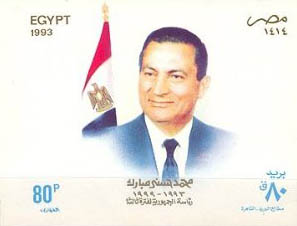
In 1993 Anthropologist Fadwa El Guindi wrote a provocative call for President Mubarak of Egupt to resign. This was almost two decades before events forced him out of office. I post the 1993 commentary by El Guindi here, courtesy of the author.
Mubarak Should Call an Election and Step Aside
Egypt: The country is a wreck; before radicals force a bloody change, he should allow open elections for a successor.
By FADWA EL GUINDI, Los Angeles Times, FRIDAY MARCH 26. 1993
If President Hosni Mubarak is smart, he will take a hard look at the shambles Egypt has become and step down, before he is overthrown or assassinated. An honorable exit might earn him forgiveness for his otherwise disgraceful record.
Egypt had its revolution in 1952, yet it remains a dependency. For example, Egyptian cotton, the highest-quality cotton in the world, is marketed in the United States as towels and bed sheets made in Israel, Britain and America. Egypt’s only part is to provide the natural resource produced by the sweat and labor of peasants living under substandard conditions. This is how it was for Egypt under British colonialism. If Egypt cannot use its very fine cotton to also make and internationally market towels, after 40 years of the revolution that promised industrialization, and if most of its income comes from Westerners visiting the accomplishments of Egyptians of millennia past, something is fundamentally wrong. And it is not fundamentalism, as the government wishes to believe or portray.
Seeds for Islamic activism, referred to as ‘fundamentalism, were sown in Egypt after -the 1967 aggression on Egypt by Israel. The swift defeat was devastating for the people. As hopelessness and despair set in, Muslims and Christians alike began to report apparitions of the Virgin Mary. ‘There was no productivity. Men escaped *the bitter reality of defeat and powerlessness by sitting in coffeehouses day and night. It was a nation in depression.
Hope was restored in the 1970s, after the Ramadan crossing of the Suez and the destruction of Israel’s front line. The country woke up to find itself immersed in consumerist capitalism, a market for the West at the expense of local production. As consumer goods entered Egypt through the door opened by President Anwar Sadat, unwelcome Westernization in lifestyle and values tried to impose itself on local tradition. Against all of this, Islam, a -legitimate source of strength and identity, was the answer.
In the 1980s, the Islamic movement, -religious and political, spread throughout Egypt and the Arab world. It was inflamed by Israel’s brutal response, with U.S. -support, to the Palestinian intifada, and by the humiliating and divisive Gulf War, -executed by the United States on behalf of -according to Arabs- the Zionist agenda. These two events dramatized the double standard in U.S. policy -perpetrating atrocities against Arabs and rejecting their rights while rewarding Israel and its repression with millions of dollars. The Islamic movement grew, both as resistance to Israel’s occupation and human rights violations and as political opposition to regimes that submit to the West’s dominance and brutalize their own people. Where the movement sought to consolidate and participate in the democratic process, as in Algeria, a total arrest of the democratic process was the response.
When Mubarak took office after Sadat’s assassination, he made a promise to the Egyptian people of instituting democratic presidential elections. A decade later, he had not only reneged on his promise but also added insult to injury by instituting himself as president for life.
Egypt’s economy is primarily tourism and consumerism, rather than local production, industrialization and services. Islamic groups provide much of the emergency, social and medical services that the state ought to provide its citizens. In turn, the Islamic movement gains ever more popular support.
Today, Egyptians live in terror, caught between those who want to remove Mubarak and Mubarak’s ruthless response to them. Prisons are filled with those who oppose his regime, all of their rights violated. One lesson from Sadat’s assassination is that leaders cannot remain in power relying on support by the United States. They must earn the support of their own people. This is especially the case at a time when Muslims face mass rape and genocide in the former Yugoslavia, when Hindus are rampaging against Muslims in India and when U.S. policy shows not one iota of sensitivity or respect to Islam.
The Mubarak government’s recent massacre of Muslims during worship in Aswan and the subsequent bloody roundups of “the usual suspects” throughout Egypt are extremist acts of desperation reminiscent of Sadat’s mass crackdown on political dissidence in the months before his assassination.
A smart move by Mubarak would be to immediately institute a free, democratic election process for president, open to candidates from all the legal opposition parties. Then, when he steps down, he will have saved Egypt from chaos and restored it as the pioneer in democratic reform and leadership in the Arab world.
Fadwa El Guindi is currently Distinguished Professor of Anthropology and Head of the Department of Social Sciences, Qatar University, Doha, Qatar.